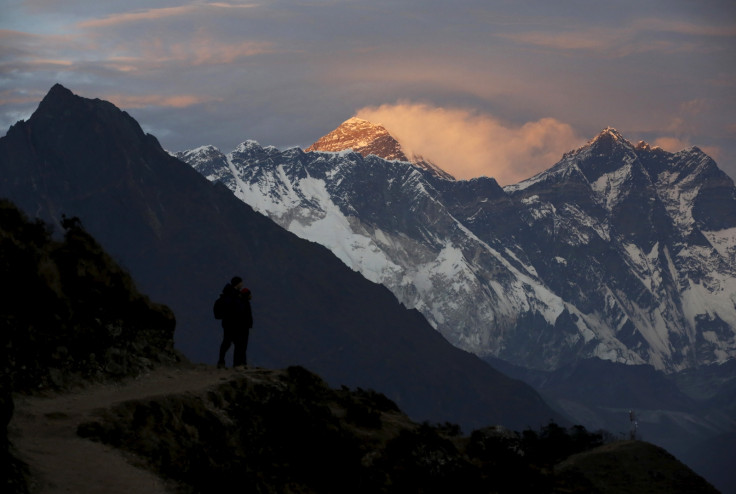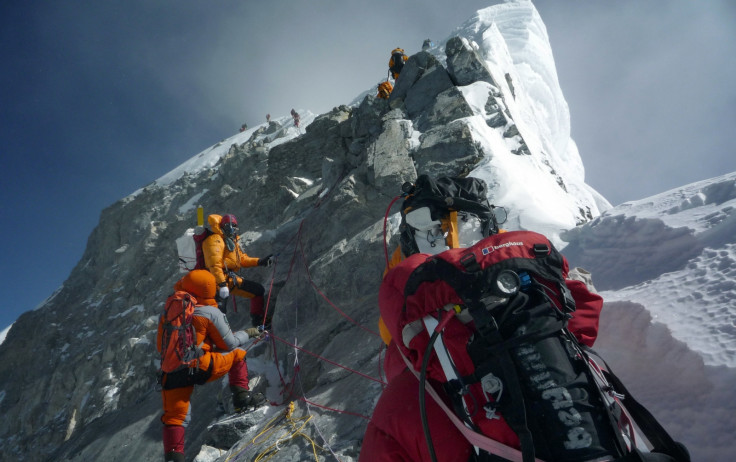Mount Everest: Oxygen bottle thefts on the rise, endangering climbers' lives
Officials suspect groups that are ill-prepared and face life-threatening situations are taking away bottles stocked by other climbers.
The increasing incidents of theft of oxygen bottles from high-altitude camps on the Mount Everest is exposing climbers to potential life-threatening situations.
Mountaineers carry a limited supply of oxygen including to account for weather and traffic-related delays during their round trip, but the thefts could lead to shortages with fatal consequences, the BBC reported.
The thefts are not new, but this year there is more of them. "It is becoming a serious issue up there," Nima Tenji Sherpa, a mountain guide just back from Everest, told the BBC.
"I kept on hearing from expedition groups that their oxygen bottles had disappeared and that could be life-threatening — particularly when they have used up what they are carrying on their way up and they are still not on the summit yet, or they plan to use the stocked bottles on their way back."
Several foreign climbers have also posted about the thefts on social media. "Another seven bottles of oxygen have gone missing from our supply," expedition leader Tim Mosedale posted on Facebook.
"This time from the South Col (camp four, the last camp before Everest at 7,900m). Thankfully Pemba, having summited Lhotse yesterday, had enough energy to go to the South Col and check our supply and report his findings.
"But will it still be there when we arrive in a few days or will a few more bottles of magic air have gone missing?"
Mosedale had earlier too posted about a similar theft on Lhotse mountain near Everest.
Who could be behind the oxygen thefts?
Officials at the Nepal National Mountain Guides Association (NNMGA) believe that the rising number of inexperienced and untrained climbers could be behind the thefts.
Groups that were ill-prepared and face life-threatening situations because they did not have adequate supplies could also behind those thefts, they added.
Some have also claimed that people are stealing the bottles to sell them at base camp. "That market appears to be thriving at the base camp," Tenji Sherpa said.

"What can you do when thieves break the locks of the tent and take away oxygen bottles, food and even cooking gas?" Phurba Namgyal Sherpa, general secretary of the NNMGA said.
"It is becoming a trend. Because of such incidents, climbers have had to return without reaching the summit because when you learn that you no more have the life-saving bottles, the first thing you want to do is get back to the base camp," Namgyal added.
Although there have been many complaints of thefts of oxygen cylinders, it is unclear from reports if there is a mechanism to officially report them to the authorities and whether, if any, action has been taken.
A Sherpa for each climber, new rule to say
The oxygen bottles are vital for climbers at high altitudes where people often suffer altitude sickness and breathing issues.
On an average, climbers need at least seven bottles of oxygen on their way up and down the Everest. They normally need it from above Camp III. Each bottle contains four litres of oxygen and climbers inhale it at different rates.

If they consume it at the highest rate of inhaling, a bottle can last up to five hours, which means they might need more bottles than normal.
But the thefts have left everyone worried and government officials are planning to introduce a new rule for climbers to address the situation.
Under the new rule, each climber will need to have a Sherpa so that everyone has enough basic requirements such as oxygen bottles, medicine and food.
"We have proposed for this to be included in the mountaineering regulation but there has to be a cabinet-level decision on this," an official at Nepal's tourism ministry said. "Frequent changes in the government have meant that our ministry has been getting a new minister every few months, and issues like this don't get addressed."
This year the Nepalese Tourism Department has issued permission about 400 people to climb the Everest, which reports say is a record. Nearly 300 have already climbed the highest peak and the remaining are waiting for the weather to clear, officials said.
There are more climbers this year because many could not make the attempt in the past two years following an avalanche that killed 16 Nepali guides in 2014 and the devastating 2015 earthquakes that prompted another avalanche, killing 18.
© Copyright IBTimes 2025. All rights reserved.





















